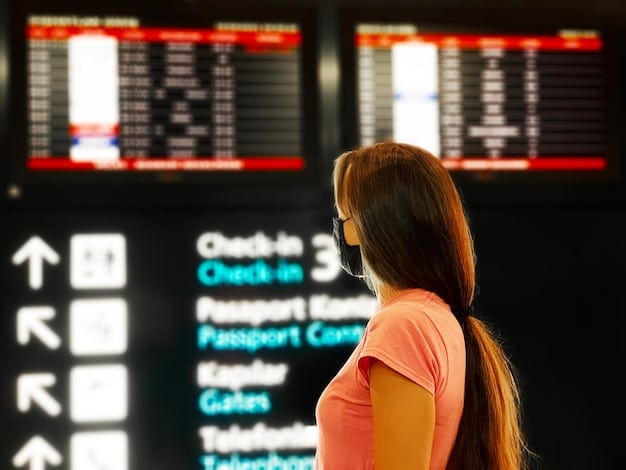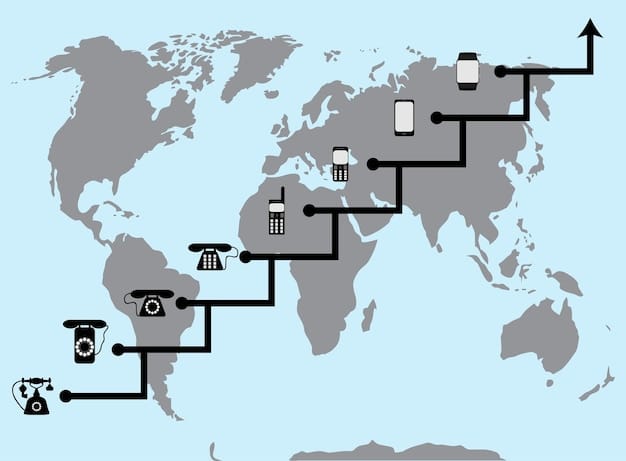Airline Miles and Fuel Surcharges: Your 2025 Guide

Airline miles can be significantly impacted by fuel surcharges, which are additional fees imposed by airlines that can drastically increase the cost of redeeming miles, making it crucial to understand how these surcharges work and how to minimize their effect when planning your travel in 2025.
Navigating the world of airline miles can be rewarding, but it’s crucial to understand all the potential costs involved. One often overlooked aspect is fuel surcharges. With careful planning and knowledge, you can minimize the impact of these fees and get the most out of your airline miles and fuel surcharges.
Understanding Airline Miles and Fuel Surcharges
Airline miles programs offer a fantastic way to travel, redeeming miles for flights. However, redeeming these miles often comes with additional costs, like taxes and fees, which include the infamous fuel surcharges. Understanding how these charges work is the first step to mitigating their impact on your travel budget.
What Are Fuel Surcharges?
Fuel surcharges, also known as carrier-imposed surcharges, are fees that airlines add to the base fare of a ticket. Airlines claim that these surcharges are meant to cover the fluctuating costs of jet fuel. However, they often serve as a way for airlines to increase revenue without significantly altering the perceived cost of a base fare.
Why Do They Exist?
The existence of fuel surcharges can be attributed to a few key factors, including the airline industry’s volatility and the need to remain competitive. They allow airlines to adjust prices dynamically in response to fuel price fluctuations and other market conditions.
- Fuel Price Volatility: Airlines use fuel surcharges as a buffer against the unpredictable nature of jet fuel prices.
- Revenue Management: These surcharges allow airlines to optimize revenue without drastically changing base fares.
- Competitive Pricing: Airlines can remain competitive by keeping base fares lower while adding surcharges.
In conclusion, grasping the essentials of airline miles and fuel surcharges is indispensable for savvy travelers, empowering them to navigate the complexities of the aviation industry and unlock the full potential of their rewards programs.

How Fuel Surcharges Impact Airline Mile Redemptions
Fuel surcharges can significantly affect the value of your airline mile redemptions. These charges are often applied to award tickets, sometimes making the “free” flight seem not so free after all. Understanding how these surcharges are calculated and applied can help you make informed decisions about when and how to redeem your miles.
Calculation of Fuel Surcharges
Fuel surcharges are typically calculated based on factors such as the distance of the flight, the class of service, and the specific airline. Some airlines apply a flat fee, while others use a more complex formula that takes into account current fuel prices and other operating costs.
Impact on Redemption Value
The presence of substantial fuel surcharges can significantly reduce the overall value of your airline miles. In some cases, the cost of these surcharges can be so high that it might be more economical to purchase a revenue ticket outright, rather than redeeming miles and paying the associated fees.
Effectively, substantial fuel surcharges can considerably diminish the overall value of your airline miles. In certain instances, these charges’ expense may render purchasing a revenue ticket outright more economical than utilizing miles and settling the accompanying fees.
- Increased Out-of-Pocket Costs: Fuel surcharges can add hundreds of dollars to your award ticket.
- Reduced Miles Value: The value you get per mile decreases when you have to pay high surcharges.
- Potential for Better Alternatives: Sometimes, paying cash for a ticket is cheaper than redeeming miles with surcharges.
In summary, fuel surcharges have a significant impact on the overall redemption value of airline miles by potentially adding considerable costs and diminishing the worth of each mile.
Airlines Known for High Fuel Surcharges in 2025
Certain airlines are notorious for imposing higher fuel surcharges on award tickets. Knowing which airlines these are can help you avoid unexpected costs and plan your travel more effectively. Being proactive and researching airline policies regarding fuel surcharges is key to maximizing the value of your miles.
Which Airlines to Watch Out For
A few airlines consistently rank high when it comes to fuel surcharges. These carriers often operate long-haul flights and may have policies that allow them to pass on higher costs to passengers redeeming miles.
Examples of High-Surcharge Airlines
Airlines such as British Airways, Lufthansa, and Air France have historically been known for high fuel surcharges. These airlines operate extensive international routes and often impose significant fees on award tickets, especially for premium classes like business and first class.
Airlines like British Airways, Lufthansa, and Air France are historically known for high fuel surcharges. These carriers operate extensive international routes and often impose significant fees on award tickets, especially for premium classes like business and first class.
- Lufthansa: Known for high surcharges on transatlantic and intra-European flights.
- British Airways: Imposes hefty fees on long-haul flights, particularly in premium cabins.
- Air France/KLM: Often charges significant surcharges on flights originating in Europe.
Therefore, knowing which airlines are prone to high fuel surcharges is essential for strategic travel planning, enabling you to make informed decisions about mileage redemption.
Strategies to Avoid or Minimize Fuel Surcharges
Fortunately, there are several strategies you can use to avoid or minimize fuel surcharges when redeeming airline miles. These tactics involve choosing the right airlines, routes, and programs to reduce the overall cost of your award travel. A proactive approach is key to sidestepping these fees.
Choosing the Right Airlines
One of the most effective ways to avoid fuel surcharges is to fly with airlines that do not impose them or have significantly lower fees. Certain airlines, particularly those based in North America, do not add fuel surcharges to their award tickets.
Using Partner Airlines
Another strategy is to use partner airlines that do not pass on fuel surcharges. Many airline miles programs allow you to redeem miles on partner airlines, and some of these partners may have more favorable policies regarding fuel surcharges.
Another strategy involves utilizing partner airlines that refrain from passing on fuel surcharges. Numerous airline miles programs permit mileage redemption on partner airlines; some partners may possess more advantageous policies concerning fuel surcharges.
- Fly on Airlines with No Surcharges: Look for airlines like United, American, and Southwest.
- Use Partner Programs Wisely: Redeem miles through programs that don’t pass on surcharges from partners.
- Consider Alternative Routes: Sometimes, flying a different route can avoid airlines with high surcharges.
In conclusion, with strategic planning by choosing the right airlines and effectively using partner airlines is important to reduce or avoid fuel surcharges and maximize your airline mile redemptions.

Airline Miles Programs and Their Fuel Surcharge Policies
Different airline miles programs have varying policies regarding fuel surcharges. Understanding the nuances of each program can help you choose the one that best suits your travel needs and minimizes the impact of these fees. Programs that offer transparency are particularly valuable.
Comparing Major Programs
Major airline miles programs, such as those offered by United, American, and Delta, have different approaches to fuel surcharges. Some programs do not impose fuel surcharges on their own flights but may pass them on when you redeem miles on partner airlines.
Navigating Program Rules
Navigating the rules of different airline miles programs can be complex, but it is essential for making informed decisions. Pay attention to the fine print and understand how each program handles fuel surcharges and partner airline redemptions.
Navigating the regulations of diverse airline miles programs can be intricate but is crucial for making well-informed decisions. Give heed to the small print and comprehend each program’s handling of fuel surcharges and partner airline redemptions.
Examples of Program Policies
- United MileagePlus: Generally does not impose fuel surcharges on its own flights.
- American AAdvantage: Similar to United, avoids fuel surcharges on most of its flights.
- Delta SkyMiles: Also typically avoids fuel surcharges on Delta-operated flights.
Therefore, understanding each program’s policies and carefully comparing the major programs can reduce or avoid fuel surcharges when redeeming airline miles.
The Future of Fuel Surcharges in 2025 and Beyond
The future of fuel surcharges is uncertain, with various factors that could influence their prevalence and impact. Staying informed about industry trends and airline policies will be crucial for navigating the changing landscape of airline miles and award travel. Looking ahead helps you prepare for potential changes.
Industry Trends
Several industry trends could affect the future of fuel surcharges. Changes in fuel prices, airline competition, and regulatory policies could all play a role in whether airlines continue to impose these fees and how high they might be.
Predictions for 2025
Predicting the future of fuel surcharges is challenging, but it is likely that they will continue to be a consideration for travelers in 2025. Airlines may adjust their policies in response to market conditions, but it is unlikely that fuel surcharges will disappear entirely.
- Potential for Increased Transparency: Pressure from consumers and regulators may lead to more transparent fee structures.
- Dynamic Pricing Models: Airlines may adopt more sophisticated pricing models that incorporate fuel costs.
- Shifting Competitive Landscape: Changes in airline alliances and partnerships could affect surcharge policies.
In summary, fuel surcharges are likely to continue to be a consideration for travelers and therefore staying informed about industry trends and airline policies will be crucial when planning travel.
| Key Point | Brief Description |
|---|---|
| 💡 Fuel Surcharges | Additional fees airlines add, supposedly for fuel costs. |
| ✈️ High-Surcharge Airlines | British Airways, Lufthansa, Air France often have high fees. |
| 🛡️ Avoidance Strategies | Choose airlines/routes with no/low surcharges. |
| ✔️ Program Policies | Understand airline miles programs’ surcharge policies. |
FAQ Section
Airline fuel surcharges, sometimes called carrier-imposed fees, are additional charges that airlines add to the base fare of a ticket. These are intended to cover the costs of jet fuel, but can vary widely.
Fuel surcharges can significantly increase the cost of redeeming airline miles, sometimes making the “free” flight quite expensive. Always factor in these charges when calculating the value of redeeming miles to make informed decisions.
Airlines like British Airways, Lufthansa, and Air France are notorious for imposing higher fuel surcharges on award tickets, especially for premium classes. It’s wise to check surcharge levels before booking.
To avoid or minimize fuel surcharges, consider flying with airlines that don’t impose them, such as United or American. Alternatively, use partner programs wisely, redeeming miles through programs with low surcharges.
In 2025, it’s essential to stay informed about industry trends and airline policies, as fuel surcharges can fluctuate. Monitor airline program rules and consider dynamic pricing models that may affect these fees.
Conclusion
Understanding airline miles and fuel surcharges is crucial for maximizing the value of your rewards and planning cost-effective travel. By staying informed, strategically choosing airlines and routes, and leveraging partner programs, you can navigate the complexities of fuel surcharges and enjoy more rewarding travel experiences in 2025 and beyond.





